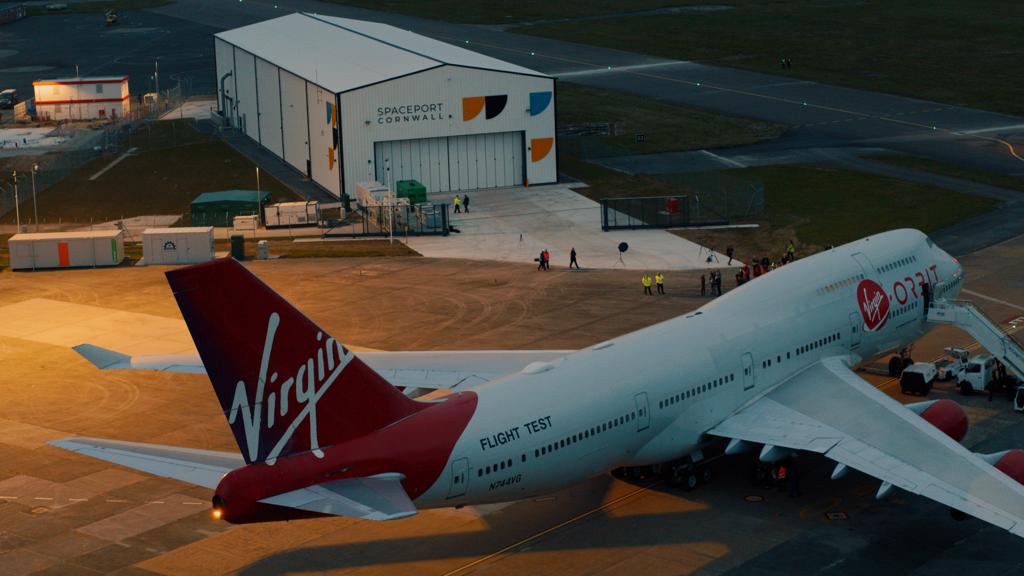Virgin Orbit Expects to Return to Spaceport Cornwall After Launch Failure

Virgin Orbit’s Cosmic Girl aircraft at Spaceport Cornwall. Photo: Virgin Orbit
Virgin Orbit could return to Spaceport Cornwall for a launch attempt as soon as this year, the launcher said Thursday as it is investigating the anomaly that caused the failure of its first mission from the United Kingdom.
Virgin Orbit has started an investigation into the Jan. 9 failure, appointing its Chief Engineer Chad Foerster to lead the investigation, with co-investigator Jim Sponnick, who was instrumental in developing the Atlas II, III, and V launch systems.
The company’s update on Jan. 12 did not provide any root cause of the anomaly. Virgin Orbit said the rocket was successfully released from carrier aircraft “Cosmic Girl,” the first stage ignited and completed stage one burn, and reached space altitudes. Stage separation, ignition of the upper stage, and fairing separation were all on the planned mission timeline.
But then, Virgin Orbit said at 180 km altitude, the upper stage experienced an anomaly which ended the first burn of the upper stage early. The mission ended and the rocket and payload fell back to Earth without achieving orbit.
It is a high profile failure for Virgin Orbit on what was supposed to be a celebratory and historic mission: the first orbital satellite launch from the U.K., the first commercial orbital launch from western Europe and Virgin Orbit’s first international launch.
“We are all disappointed that we were not able to achieve full mission success and provide the launch service that our customers deserve,” Virgin Orbit CEO Dan Hart commented. “Given our four previous successful missions, which have proven our technology, our team’s deep understanding of the LauncherOne system from massive amounts of previously collected flight data, and the ample telemetry data that was collected characterizing the flight and the anomaly, I am confident that root cause and corrective actions will be determined in an efficient and timely manner.”
Virgin Orbit will complete the investigation before its next flight, planned from Mojave Air and Space Port in California.
The launcher is also in “active discussions with key government and commercial stakeholders in the U.K. to start planning mission opportunities for as soon as later this year.”
Virgin Orbit’s stock $VORB dropped after the failure to $1.62 on Thursday after trading at $2.11 just before the mission.
Tuesday’s mission lost payloads for government customers: the U.K. Ministry of Defence; U.K.’s Defense Science and Technology Laboratory; the U.S. Naval Research Laboratory; and the government of Oman.
The primary payload was Prometheus-2 — two cubesats owned by the U.K. Ministry of Defense’s Defense Science & Technology Laboratory, designed by Airbus Defence and Space and In-Space Missions to support MoD science and technology.
Commercial customers included a collaboration between Satellite Applications Catapult, Horizon Technologies, and AAC Clyde Space; RHEA Group and Open Cosmos; Space Forge; and SatRev.
It was the first satellite for the government of Oman and the first satellite from Wales as well, with Welsh startup Space Forge.
“We are devastated that due to a technical anomaly with Virgin Orbit’s system our ForgeStar-0 platform didn’t make it to orbit as we’d planned,” Space Forge CEO Joshua Western said in a statement. “However, our ForgeStar-1 mission has been in production for over six months and we have a launch scheduled later this year — we continue to move forward at a great pace. Despite not meeting our planned mission, I’m incredibly proud of the team for not only producing this in such a short space of time, but also for getting Walse’s first ever satellite to the launch pad.”
AAC Clyde Space put out a statement on the failure and loss of the IOD-3 satellite it built. “We are sad for the loss of IOD-3 during its launch. Our teams in Glasgow worked intensely together with Horizon Technologies and the Satellite Applications Catapult to design, build and test the satellite and its loss is a disappointment to us all. I thank our team for the excellent, hard work they did during this exciting project. It was an example of dedication and an expression of technical competence.” CEO Luís Gomes.
AAC Clyde Space said it is not financially impacted by the loss as it had completed all work for the payload.
Virgin Orbit has had four prior successful launches after its maiden orbital flight failed in May 2020. It had successful launches in January 2021, June 2021, January 2022, and July 2022.